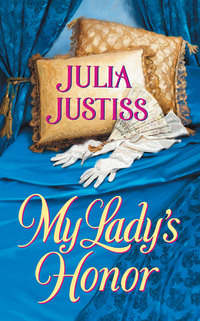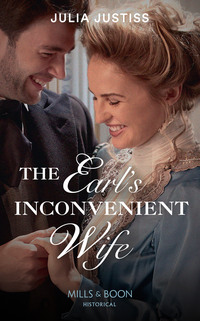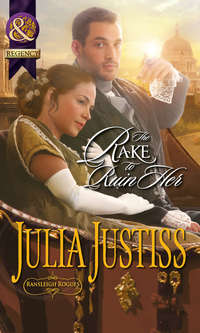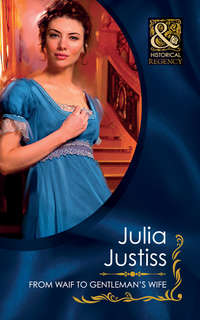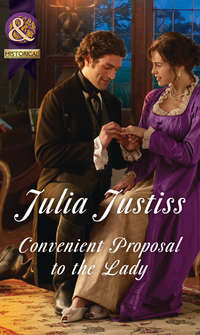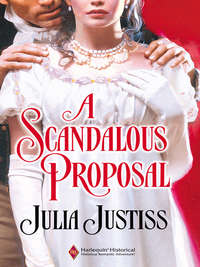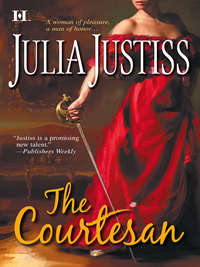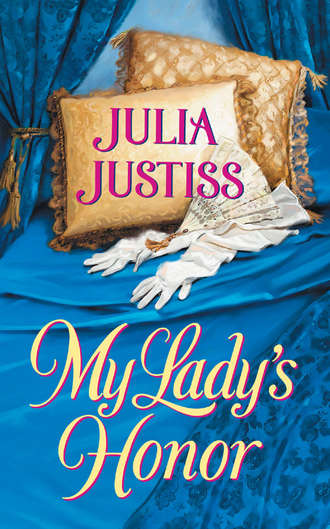
Полная версия
My Lady's Honor

“You miserable arrogant excuse for a gentleman,”
she all but snarled, punctuating her epithet with another swipe from the whip.
Gilen dodged the whirling thong and backed away, his initial astonishment giving way to incredulous delight. By heaven, she was magnificent! This girl still garbed like a proper ton maiden had changed before his eyes from demure virgin into the passionate creature who had told his fortune, teased his wits and tantalized him with a dance.
“You find this amusing?” she choked out. And lashed the whip at him again.
He ducked as the leather tip nearly caught his left ear. “If you can’t control yourself, I’ll have to disarm you.”
Ah, that she might compel him to do it! With her body bound closely to his was exactly where this astonishing, intoxicating, intemperate vixen belonged.
He couldn’t wait to see how her passionate nature played out in his bed…!
Praise for Julia Justiss’s recent books
My Lady’s Trust
“With this exceptional Regency-era romance, Justiss adds another fine feather to her writing cap.”
—Publishers Weekly
The Proper Wife
“Justiss is a promising new talent and readers will devour her tantalizing tale with gusto.”
—Publishers Weekly
A Scandalous Proposal
“Ms. Justiss’s writing style makes it impossible to put this delightful tale down.”
—Rendezvous
The Wedding Gamble
“This is a fast-paced story that will leave you wanting more…you won’t want to put it down!”
—Newandusedbooks.com
DON’T MISS THESE OTHER TITLES AVAILABLE NOW:
#627 CHRISTMAS GOLD
Cheryl St.John/Elizabeth Lane/Mary Burton
#628 BADLANDS LEGEND
Ruth Langan
#630 THE BLANCHLAND SECRET
Nicola Cornick
Julia Justiss
My Lady’s Honor

Available from Harlequin Historicals and
JULIA JUSTISS
The Wedding Gamble #464
A Scandalous Proposal #532
The Proper Wife #567
My Lady’s Trust #591
My Lady’s Pleasure #611
My Lady’s Honor #629
To my mother,
Beatrice Ruth Langley,
who taught me a woman can do anything.
For your love and support,
thanks, Mom.
Contents
Chapter One
Chapter Two
Chapter Three
Chapter Four
Chapter Five
Chapter Six
Chapter Seven
Chapter Eight
Chapter Nine
Chapter Ten
Chapter Eleven
Chapter Twelve
Chapter Thirteen
Chapter Fourteen
Chapter Fifteen
Chapter Sixteen
Chapter Seventeen
Chapter Eighteen
Chapter Nineteen
Chapter Twenty
Chapter Twenty-One
Chapter One
“Your cousin Nigel—that is, the new Baron Southford, be awaitin’ ye in the library,” the maid informed her with a curtsey.
Gwennor Southford sighed and removed the apron with which she’d covered her mourning gown while she helped Jenny and the staff clear away the remains of the breakfast they’d served after her father’s interment. “Thank you, Jenny. Tell him I will join him shortly.”
While the maid departed, Gwen stopped to check her hair in the black-draped hall mirror, making sure no unruly strands had escaped her coiffeur to catch the eye of her punctilious cousin. A London dandy of the first stare, Nigel never failed to look at her without a slightly pained expression, as if she offended him by sporting soot on her nose or a spot on her gown. Which most of the time, she allowed, she probably did.
Or perhaps it was just that, not being able to peer down at her from a superior height, cousin Nigel tried to intimidate her with his faintly contemptuous gazes. Though they did not succeed in leaving her in awe of him, she did often feel like a large, ugly and not very interesting beetle being inspected under a glass.
Finding that her thick black hair, which had a tendency to curl wildly despite her efforts to subdue it, was still neatly braided, Gwen walked on to the library. She couldn’t imagine what cousin Nigel needed to say to her that could not have been expressed in front of a roomful of other guests.
Perhaps he merely wished to complain—again—about the meals or accommodations. Which, she had no doubt, he would soon be “improving” by the addition of a foreign chef to create dishes more suitable to his cultured palate, followed by an army of workmen to update the century-old rooms to a more fashionable mien.
She grimaced at the idea of her beloved home being transformed under his ruthless hand. Pray God she could convince him to send her to London for the upcoming Season, so she might find a husband and Parry and herself a new home.
Damping down a niggle of unease, she knocked on the library door then entered.
She had to suppress a pang at seeing her cousin lounging in her father’s favorite chair behind the massive desk. Wrenching her thoughts from reflections that could only bring on another wave of useless grief, she curtseyed and forced herself to focus on Nigel.
Once again he subjected her to a lengthy, critical inspection. “Well, cousin Gwennor, I’m afraid the years have not much improved you, but at least you’ve the sense to keep that peasant’s hair tightly braided, and your other features are not unpleasant. I suppose, with the addition of a small dowry, you will do well enough.”
“Thank you, cousin,” Gwen said sweetly with a clenched-teeth smile, “for your kind condolences on my father’s death. And I am…gratified to earn your approval.”
“Your tendency to indulge in levity at inappropriate moments does not become you, Gwennor,” he replied loftily. “I’m quite certain I offered you my sympathies upon my arrival yesterday. However, it does no good to linger in the past. Changes will be taking place at Southford now that I am baron, and you must adapt to them.”
“Naturally, cousin.” She would not refer to him as “my lord,” she thought mutinously, no matter that she was no longer the daughter of the house but merely a female relation dependent on his charity. “Does your reference to my dowry mean that you intend sending me to London for the Season, as I’ve requested? I shall be ready to leave as soon as my bags can be packed.”
She cast her eyes down and clasped her hands in such a picture of maidenly humility that Nigel, no fool despite his affectations, gave her a sharp look.
“I have given thought to your eventual settlement, yes. I think we both agree that it is in neither of our interests that you remain at Southford. After all, the quality of establishment you maintained for your papa, though adequate enough, I suppose, for a Welsh baron of rural tastes, will not do for me.”
“No, cousin, my sort of household—” which, she added silently, would be notable for simplicity, kindness and courtesy to all “—would definitely not suit you.”
“I’m glad we agree on that score. And since with the alterations necessary to bring the manor and outbuildings up to the standards worthy of my stewardship, the estate is likely to suffer some heavy financial demands, I see no reason to throw away money on a London season. You’re well past the age of presentation, no great beauty and your dowry is merely adequate. I do not wish to be unkind, but a dispassionate assessment must conclude that your chances of attracting the eye of a gentleman wealthy and influential enough to make a connection with his family worth the heavy expense of sending you to London are, I regret to say, remote. In this, you must trust my far greater knowledge of the sensibilities of ton gentlemen.”
So used to his disparagement that his strictures scarcely made her wince, Gwen’s active mind considered instead the implications. Not London. Would he send her to Bath, perhaps? Or to the Assembly in Gloucester?
“It was to announce my solution to this delicate dilemma that I summoned you. Of course, I am fully sensible that as a Southford and my cousin, you must wed a man of good reputation and standing, if not one as discriminating in his requirements as I am myself. I have chosen such a husband for you, cousin. You may congratulate yourself on soon becoming the bride of Lord Edgerton.”
Shock riveted her to the spot. “Edgar Edgerton, B-Baron Edgerton?” she stuttered, hoping there might be some misunderstanding.
“Indeed,” the new Lord Southford replied, smiling benevolently. “I can see how overwhelmed you are by my choice. Lord Edgerton may be a trifle older than you, but he is still a fine figure of a man, and his six motherless sons, poor lads, will give you ample opportunity to practice your preferences for frugality and a rustic outdoor life.”
Gwen swallowed hard. Edgar Edgerton, a hunting crony of Nigel’s, was pushing fifty, with a short, stout figure and high coloring that indicated a probable tendency to gout. He resided all year on his estates in Lincolnshire, having, as far as Gwen knew, few interests beyond his stables and his kennels. There would certainly be no need to expend Southford estate money on modish gowns for her trousseau, she thought acidly.
“I…I have heard by all reports that Lord Edgerton is a most…amiable gentleman,” she said with only a slight quaver in her voice. “But I am somewhat concerned about his sons, whom rumor would hold to be a bit…spirited.” In truth, the alarming escapades indulged in by the baron’s energetic offspring, descriptions of which had been brought back to Southford by her father when he hunted with the baron’s pack the previous year, had made even as indulgent a gentleman as her papa shake his head in dismay. “I hope they will not be too rough with Parry.”
Her cousin had been listening idly, his attention focused on removing a barely visible speck of lint from the sleeve of his immaculate coat of black superfine, but at this his fingers stilled. “Parry?” he said with a frown. “What has that half-wit to do with this?”
“Well, naturally I assumed that since you do not…get on with Parry, he would go with me when I married.”
“Whatever would cause you to believe such nonsense as that?” her cousin demanded, his tone aggrieved. “Use what little wit you possess, Gwennor. For one thing, your father long ago designated me as the boy’s guardian after his death. Even though he’s not a blood relative, I am not one to shirk a duty, no matter how distasteful. Besides, Lord Edgerton, who prides himself upon the bloodlines of his breeding stock, could never abide having that degenerate about, no more than would any other person of sensibility.”
“Parry is no degenerate,” Gwen replied hotly, “and he possessed more wit than you until that stallion kicked him!”
Nigel looked at her with cold eyes. “I shall forgive you that remark only because I know you still harbor some ridiculous conviction that, since Parry was injured going to your defense, you are obligated now to defend him. But do not trespass too far upon my goodwill. I grant you, so devastating an accident occurring to a child of his tender age was tragic, but ’tis long past time to be done with such sentimentality. He’s now—eighteen, is he not? He should have been confined years ago, instead of being allowed to wander the woods and fields of Southford, an embarrassment to the family and a threat to the countryside.”
“Parry is no threat to anyone!” Gwen protested. “He treats every fellow creature with consideration! And he’s not an embarrassment—everyone at Southford knows and appreciates him.” Save you, she thought furiously.
“Not an embarrassment?” Nigel retorted. “And what would you call it when he interrupted the solemnity of your father’s obsequies, stumbling into the church in dirty boots and a torn jacket, his pocket full of wild creatures!” He made a grimace of repulsion.
“Baby rabbits,” Gwen replied, trying to hold back the tears that threatened. “Papa was developing a new domestic strain, you’ll remember, and interbreeding them with the darker-colored wild rabbits from the mountains. Parry brought him those as a parting gift.”
“Gift—bah!” Nigel said contemptuously. “That drooling simpleton had no idea the man who’d died was his stepfather—nor any conception of what death means. Although he’s soon to get a lesson in the latter.”
“You’re wrong, cousin Nigel. He knew it was his papa,” she emphasized the word, “and he understands about death.” True, Parry might not have comprehended the threat to his own position implicit in his stepfather’s demise, a threat that—with good reason, it turned out—Gwen had so feared, but he knew the elderly man who’d treated him with love and gentleness had gone away forever.
“Well, I find him offensive, so something shall certainly be done about it. Edgerton wishes to have you settled in at the Hall between the last of the hunting season and the beginning of spring planting, so the wedding is to be at week’s end, here at Southford. Given the groom’s age and the shortness of time to prepare, I see no need for anything elaborate. A simple ceremony with a small reception immediately after should be sufficient.”
Cheese-paring nip-squeeze, Gwen thought, too furious to respond. The will had not even been read yet, and already the new baron was determined to expend as few funds as possible on the former daughter of the house.
“Congratulations on your good fortune, Gwennor. You may go now to begin the preparations.” He waved an imperious hand toward the door—dismissing her from her own library like a lackey.
Too shocked and angry to reply with a remark her cousin would consider suitable for a gentlewoman, in icy silence she pivoted toward the door.
“By the way,” her cousin’s voice halted her before she reached the doorway, “since I expect your bridegroom sometime tomorrow, I intend to have your stepbrother…taken care of before his arrival. Parry shall be confined to the attics, where he can be restrained but kindly treated, at minimal expense. Oh, and should you suffer from some maidenly excess of nerves before the wedding and attempt to call off your nuptials, remember that I have the power to confine you as well, should you take a sudden notion not to acquiesce willingly in my plans.”
He paused, regarding her thoughtfully. She stared back at him, defiantly mute, not caring that he could probably read on her face the intensity of her dislike.
“I shall warn you only once,” he said softly. “Growing up, you had a deplorable tendency to obstinacy and disobedience, traits I doubt your weak-willed papa ever succeeded in rooting out of you. I am not a man who can be manipulated by a shrewish spinster entirely too accustomed to running things her own way. I am master here now, and the servants will obey me.” He nodded. “That is all.” And looked down to peruse a ledger on the desk.
Her head and heart teeming with a volatile mix of grief, anguish, worry over her brother, fury at her cousin’s threats and fear for the future, Gwen picked up her skirts and half ran through the hall, down the servants’ stairs to the deserted stillroom and out the back door.
Shivering in the late-winter cold, she continued on behind the gardens to the barn surrounded by a collection of sheds and pens where her brother carried out his father’s breeding experiments. She spied Parry’s dark head bent over one of the cages and walked in his direction. His sharp ears no doubt picking up the soft pad of her footsteps, he looked up and smiled at her.
As she drew closer, his smile turned to a frown. “You have no shawl! You’ll be cold, Gwen.” Before she could stop him, he shucked his tattered wool jacket and wrapped it around her shoulders.
She reached up to hug him fiercely, tears seeping now from the corners of her eyes. How she loved her gentle, serene brother. Even did she not, as Nigel had alleged, feel responsible for his injuries, Parry was so unspoiled and utterly pure a soul she must love him, as nearly everyone in the county did, for his healing hands and sweet-tempered kindness.
He had a special touch with animals and young people. Both seemed to respond to his straightforward nature and both seemed to sense how competently he could soothe and help them. Not only had Parry directed her papa’s rabbit-breeding operations, he was sought by neighbors from all over to treat their ailing livestock, providing, despite Nigel’s dismissal of his usefulness, a small income to Southford’s coffers.
The whole county knew if Parry Wakefield could not cure an animal’s ills, the owner might as well prepare to bury it.
What was she to do? Gwen wondered as she held her brother close. She might detest Nigel, but she wouldn’t make the mistake of underestimating him. If he’d said he would put Parry under restraint, he would do it. And he would have no compunction about locking her up too if she tried to stop him. Nor did she wish to put the servants in the untenable position of opposing their new master.
At last she released Parry. He held her at arm’s length, his guileless face studying hers. “You’re sad, aren’t you, Gwen? Are you missing Papa? I am, too. Look at these babies.” He opened a wicker cage and indicated some tiny balls of fluff. “Misty had them Sunday past—and they are all browns. Just what he wanted. I think he’s happy, looking down at them from heaven.”
“I’m sure he is.” Happier than any of us this side of heaven are likely to be again, she thought bitterly.
Her brother had been wholly content since his physical recovery from his injuries, wandering the estate at Southford, watched over by family and neighbors who cared for him, collecting and succoring the animals he loved.
He would pine away and die without them, locked up in the attics at Southford Manor.
Well on the shelf at five-and-twenty, Gwennor had no illusions about her beauty or her prospects. She’d taken over the management of the household at age fifteen, upon the death of her stepmother—the only mother she remembered, her own having died at her birth. In her concern for her stepbrother and her grieving papa, she’d easily withstood the baron’s half-hearted attempts to send her away for a Season several years later. If Lord Edgerton were prepared to accept Parry, she would give herself to him, if not enthusiastically, at least with resignation.
But would he?
She’d have little time to plead with him, and no leverage to bargain with. Besides, Nigel was probably correct. Most people shied away from anyone with an impairment, which was often looked upon as God’s judgment upon the unhappy individual and his family. Being Nigel’s friend—indictment enough in Gwen’s opinion—as well as a fanatic on the purity of the bloodlines of his horses and dogs, Edgerton would doubtless agree with Nigel’s solution for dispensing with the embarrassment of his bride’s mentally deficient brother. No, she concluded, Parry would find no champion in Edgerton.
And if he would not accept Parry, she had no reason to wed the man, despite Nigel’s threats. She’d not spent the last ten years, as he’d described her, an obstinate spinster growing accustomed to running things her own way, to meekly succumb to her detestable cousin’s plans for either herself or her beloved stepbrother.
“I must feed the others,” Parry said. “Can you help?”
“No, I must get back to the house. Here, take your jacket back before you catch a chill.”
She held it out. With a smile he waved it away. “I’ll get it later. I have these—” he scooped up a handful of soft rabbit babies “—to keep me warm.”
She turned to walk to the house, her anxiety sharpening. Tomorrow morning was terrifyingly close. She would have to think of some way to rescue them both before then, but to be safe, ’twas better for her brother to remain well away from the house until she decided how she was going to do it.
“Parry!” she called back to him. “Nigel will be down for dinner.”
Her brother’s smile faded. The only person her friendly stepsibling did not like was their father’s cousin. “Must I come eat with him?”
“No. Stay with the animals. I’ll bring you a tray later. No sense both of us having to deal with him.” She made an exaggerated grimace of distaste that set her brother laughing.
“Thank you, Gwen. I’ll find you a surprise for tonight.”
A lovely surprise it would be, too, she knew—a bird’s nest he’d rescued, or a rock crystal of unusual shape and color, or an intricately woven spider’s web as complex and beautiful as a master engraving.
Unlike the surprise his cousin had in mind for Parry tomorrow.
A fate he will never suffer while I draw breath, Gwennor vowed, and walked purposefully back to the house.
Chapter Two
Her mind working furiously, Gwennor paced across the stableyard. They would have to leave tonight, secretly, after her cousin and the rest of the household had retired. She would tell Jenny and Cook when they prepared Parry’s tray that she planned to work with him well into the evening, so not to wait up for her—a fairly frequent occurrence that should protect the servants from potential dismissal for not alerting their new master that she’d left the house. Since her cousin slept until noon, it was quite possible he’d not discover their disappearance until rather late tomorrow. Perhaps not even, she thought with a savage grin of satisfaction, until his dear friend Lord Edgerton arrived and he summoned the blushing bride to greet her eager bridegroom.
She’d need to pack a small bag—something that could be easily and surreptitiously transported. She’d better bring all her mother’s jewelry; she would not put it past her cousin, once he discovered she’d fled, to sell it and keep the money. She’d also need to sneak into the office while cousin Nigel took his nap before dinner. Considering that she’d be saving the estate the expense of her wedding breakfast, she felt justified in removing all the coins currently in the estate’s strongbox.
She would also have to go through the motions of planning a wedding. Though she didn’t need to seem enthusiastic—that would certainly be suspect—Nigel might well inquire about the progress of her preparations at dinner and would find it suspicious if she had not set the servants to beginning the arrangements. They would have to be warned of Lord Edgerton’s imminent arrival in any event.
Having dispensed with the details of getting away, she turned her thoughts to the thornier problem of where they would go and how they would get there.
By now she’d reached the house. Gwennor paused before the stillroom door. ’Twas still too early to risk entering the estate office. Best to slip unnoticed up to her chamber and finish planning.
She crept up the servants’ stairs to her room and paced to the window. Hands clasped in concentration, she stared unseeing over the rose and herb gardens.
If only her first cousin Harry weren’t away with Wellington in the Peninsula! First in each other’s affections, they’d always joked. They’d been boon companions throughout the time she was growing up. Were he at home, Gwennor knew he would assist her escape. But though his mama, her aunt Frances, resided an easy two days’ ride from Southford, that widowed lady would be no match for a determined cousin Nigel, should he decide to pursue his disobedient kinswoman.
Would he pursue her? Or simply wash his hands of her, glad to be rid of the burden of a cousin he’d never liked?
Were it not for the plans he’d set in train to marry her off to his crony, she might well think the latter. But she did not believe his kindly-elder-cousin talk of arranging her marriage to insure she had a permanent position worthy of her breeding. She suspected there was far more to the agreement, and given her cousin’s proclivities, probably something involving money.


